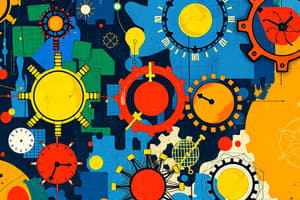Podcast
Questions and Answers
Which of the following branches of science focuses on the study of living organisms and their interactions?
Which of the following branches of science focuses on the study of living organisms and their interactions?
- Mathematics
- Physics
- Engineering
- Biology (correct)
What is the purpose of the experimentation stage in the scientific method?
What is the purpose of the experimentation stage in the scientific method?
- To draw conclusions
- To design and execute experiments to test the hypothesis (correct)
- To form a hypothesis
- To analyze data
What is a scientific theory?
What is a scientific theory?
- A well-substantiated explanation for a set of phenomena (correct)
- A factor that can be changed or manipulated in an experiment
- A statement describing a consistent pattern or relationship in nature
- A tentative explanation or prediction
What is the focus of basic science?
What is the focus of basic science?
What is the role of a control group in an experiment?
What is the role of a control group in an experiment?
Which branch of science is concerned with the study of composition, properties, and reactions of matter?
Which branch of science is concerned with the study of composition, properties, and reactions of matter?
What is the first step in the scientific method?
What is the first step in the scientific method?
What is the term for a factor that can be changed or manipulated in an experiment?
What is the term for a factor that can be changed or manipulated in an experiment?
Flashcards are hidden until you start studying
Study Notes
Branches of Science
- Natural Sciences: Study of natural phenomena and laws of nature
- Biology: Study of living organisms and their interactions
- Chemistry: Study of composition, properties, and reactions of matter
- Physics: Study of matter, energy, and fundamental laws of the universe
- Formal Sciences: Study of abstract systems and structures
- Mathematics: Study of numbers, quantities, and shapes
- Logic: Study of reasoning and argumentation
- Applied Sciences: Practical application of scientific knowledge
- Engineering: Application of scientific principles to design and build structures, machines, and systems
- Medicine: Application of scientific principles to prevent, diagnose, and treat diseases
Scientific Method
- Observation: Identification of a problem or phenomenon
- Hypothesis: Formation of a tentative explanation or prediction
- Experimentation: Design and execution of experiments to test the hypothesis
- Data Analysis: Collection and interpretation of data from experiments
- Conclusion: Drawing conclusions based on data analysis and hypothesis testing
Key Concepts
- Scientific Theory: Well-substantiated explanation for a set of phenomena
- Law of Science: Statement describing a consistent pattern or relationship in nature
- Hypothesis: Tentative explanation or prediction to be tested
- Variable: Factor that can be changed or manipulated in an experiment
- Control Group: Group in an experiment that is not exposed to the variable being tested
Types of Science
- Basic Science: Focus on understanding fundamental principles and laws
- Applied Science: Focus on practical applications of scientific knowledge
- Interdisciplinary Science: Combines multiple disciplines to study complex phenomena
- Citizen Science: Involves non-experts in scientific research and data collection
Branches of Science
- Natural Sciences involve the study of natural phenomena and laws of nature, encompassing:
- Biology, which explores living organisms and their interactions
- Chemistry, which examines the composition, properties, and reactions of matter
- Physics, which delves into matter, energy, and fundamental laws of the universe
- Formal Sciences focus on abstract systems and structures, comprising:
- Mathematics, which deals with numbers, quantities, and shapes
- Logic, which investigates reasoning and argumentation
- Applied Sciences concentrate on the practical application of scientific knowledge, including:
- Engineering, which applies scientific principles to design and build structures, machines, and systems
- Medicine, which applies scientific principles to prevent, diagnose, and treat diseases
Scientific Method
- The scientific method begins with Observation, identifying a problem or phenomenon
- A Hypothesis is then formed, providing a tentative explanation or prediction
- Experimentation follows, involving the design and execution of experiments to test the hypothesis
- Data Analysis involves collecting and interpreting data from experiments
- The process concludes with a Conclusion, drawing inferences based on data analysis and hypothesis testing
Key Concepts
- A Scientific Theory is a well-substantiated explanation for a set of phenomena
- A Law of Science is a statement describing a consistent pattern or relationship in nature
- A Hypothesis is a tentative explanation or prediction to be tested
- A Variable is a factor that can be changed or manipulated in an experiment
- A Control Group is a group in an experiment that is not exposed to the variable being tested
Types of Science
- Basic Science concentrates on understanding fundamental principles and laws
- Applied Science focuses on practical applications of scientific knowledge
- Interdisciplinary Science combines multiple disciplines to study complex phenomena
- Citizen Science involves non-experts in scientific research and data collection
Studying That Suits You
Use AI to generate personalized quizzes and flashcards to suit your learning preferences.



